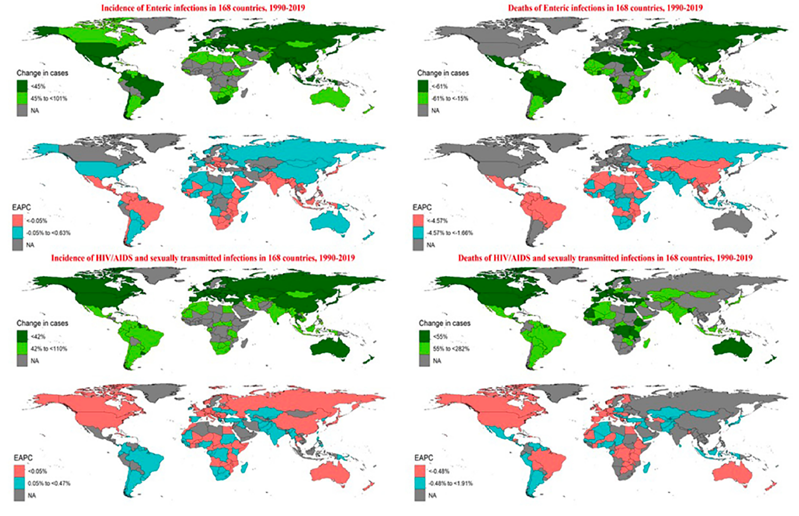Assessing the Global Impact: Floods and Infectious Diseases Over Three Decades
Published 20 September, 2023
Natural flood disasters affect more people than any other environmental hazard and hinder sustainable development. These events have far-reaching consequences, including serious health, social and economic ramifications. A previous study has revealed alarming statistics: between 1980 and 2009, over 500,000 lives were lost, and nearly 3 billion people experienced the devastating effects of floods worldwide. Moreover, recent findings have underscored the extent of flood risk under current conditions, indicating that a larger population than previously recorded is now vulnerable—with 1.81 billion people directly exposed to 1-in-100-year floods.
Infectious diseases often emerge in the wake of natural flood disasters, primarily due to the prolonged secondary effects. This phenomenon becomes especially pronounced when the local infrastructure is severely damaged, leading to the interruption of critical public health measures. Among the myriad challenges faced in this context, one of the most prevalent concerns from an infectious disease perspective is the contamination of drinking water sources.
However, our understanding of the correlation between natural flood disasters and infectious diseases remains incomplete. Notably, there is a lack of quantified analysis of the association between natural flood disasters and the incidence of new cases and fatalities from various infectious diseases.
This knowledge gap has prompted a team of researchers in China to estimate the association of natural flood disasters with new cases and deaths of different infectious diseases globally from 1990 to 2019, using global data that spans across three decades.
“We found that for every additional day of natural flood disasters, there was a corresponding increase in the number of new cases for neglected tropical diseases and malaria by 0.042%, as well as respiratory infections and tuberculosis by 0.010%,” shares co-corresponding author of the study Jue Liu from the School of Public Health, Peking University. “We also observed a significant correlation between prolonged flood durations and a rise in new cases of several infectious diseases, including acute hepatitis A, acute hepatitis E, dengue, malaria, measles, meningitis, tuberculosis, typhoid, and paratyphoid, as well as upper respiratory infections.”
The team reported their findings in the KeAi journal Global Transitions. Notably, this study is the first of its kind to offer a comprehensive perspective on the trends of natural flood disasters and their association with various infectious diseases globally during the three decades preceding the onset of the COVID-19 pandemic.
The findings highlighted the importance for collaboration among policymakers, scientists, and the public to develop effective strategies for preventing and managing flood-related infectious diseases.
“In the context of global warming, the risk of extreme weather-induced floods is rising, making the prevention and control of infectious diseases stemming from disasters more critical than ever," co-corresponding author Min Liu from the Department of Epidemiology and Biostatistics at Peking University's School of Public Health. “Future initiatives should prioritize targeted intervention studies, particularly in resource-constrained regions.”

Contact author name, affiliation, email address: Min Liu, Department of Epidemiology and Biostatistics, School of Public Health, Peking University, No. 38, Xueyuan Road, Haidian District, Beijing, 100191, China, liumin@bjmu.edu.cn. OR Jue Liu, Department of Epidemiology and Biostatistics, School of Public Health, Peking University, No. 38, Xueyuan Road, Haidian District, Beijing, 100191, China, liujue@bjmu.edu.cn.
Funder: This work was supported by the National Natural Science Foundation of China (grant number 72122001).
Conflict of interest: Wannian Liang is the editor-in-chief for Global Transitions, Min Liu and Jue Liu are Editorial Board members for Global Transitions, and all of them were not involved in the editorial review or the decision to publish this article. All authors declare that there are no competing interests.
See the article: Qiao L, Jie Yuan, et al., Association of natural flood disasters with infectious diseases in 168 countries and territories from 1990 to 2019. Global Transitions. 2023; 5: 149-159. https://doi.org/10.1016/j.glt.2023.09.001

